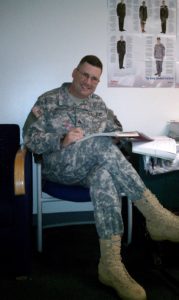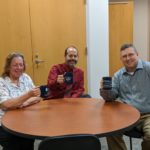
Staff Sgt. Ryan Hastings served for 20 years with the U.S. Army before becoming UMW’s veterans liaison in 2019.
Staff Sgt. Ryan Hastings began the year on a mission. He wanted to purchase lapel pins for faculty and staff to show solidarity with veterans and students from military families, who make up a sizeable chunk of the University of Mary Washington community. He shored up support from the Staff Advisory Council, the Office of the President and UMW’s Veterans Resource Center and found a local veteran-owned business to produce the pins.
Then came COVID-19. Everything was put on hold, that is, until Hastings decided to pay out of his own pocket for the pins, he said, “in a small act of defiance against the pandemic.”
This kind of commitment to those who have served is what led to Hastings – a 20-year U.S. Army veteran – becoming UMW’s Veterans Liaison in 2019. He previously earned a Bachelor of Liberal Studies degree in History and Communication from UMW and a post-baccalaureate degree in Leadership and Management Studies.
“As a student, I found it difficult to relate to many of my younger classmates,” said Hastings, adding that veterans tend to be older and married with children. Based in the Registrar’s Office on the Stafford Campus, he draws from personal experience to help the graduate students seeking their MBA or Master in Education, as well as the undergrad students using the V.A. Vocational Readiness and Employment education benefits to acclimate to life at UMW, often coordinating with other departments across the University.
After arranging tutoring for one student, Hastings shared how UMW’s Office of Disability Resources had helped him in college. He also brought him to the Veterans Resource Center on the University Center’s first floor, where veterans and military-connected students can study, relax and connect with other former service members.
“If you’re a veteran looking to recapture the camaraderie you had in the military,” he said, “I encourage you to give it a try.”
- Ryan Hastings and his children at his UMW commencement ceremony. He earned a Bachelor of Liberal Studies dual degree in History and Communication from UMW in 2015 and a post-baccalaureate degree in Leadership and Management Studies in 2019.
- UMW Veterans Liaison Ryan Hastings (right) with Stafford Campus colleagues Elizabeth Sanders, enrollment services assistant, and Kevin Caffrey, senior associate registrar.
- Staff Sgt. Ryan Hastings served as a bugler for 20 years with the the U.S. Army Fife and Drum Corps at Fort Myer in Arlington.
Q: What motivated you to join the military?
A: I grew up in a musical family, so I wanted to serve in one of the military bands stationed near Washington, D.C. After an intense audition process, I was fortunate to earn a spot with the U.S. Army Fife and Drum Corps and serve as a bugler at Fort Myer in Arlington for 20 years.
Q: What do you remember about your time in the military?
A: Marching in five inauguration ceremonies for Presidents Clinton, Bush and Obama and performing at the opening of the D-Day Museum in New Orleans, where I met Tom Hanks. But I’m also haunted by the memories of the 9/11 attacks on the Pentagon. Many of us saw it happen and were later tasked with removing the remains.
Q: What’s the most rewarding part of your job?
A: Engaging with UMW’s veteran community and helping them make their academic goals a reality.
Q: The most challenging?
A: Working with a student who just transitioned out of the military. There are a few required steps to set up education benefits through the Veterans Affairs office, which moves at a glacial pace.
Q: How has life changed for you now that you’re a veteran?
A: I’ve enjoyed using the word “no” a lot. I wasn’t able to say it very much between 1995 and 2015.


